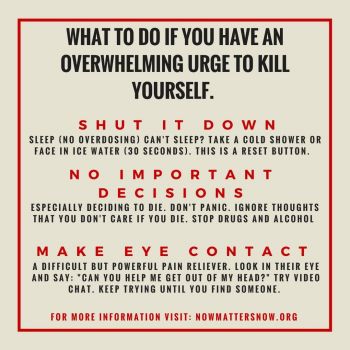|
www.HealthyHearing.com |
Tinnitus and suicidal thoughts: What to do when life feels overwhelming
Contributed by Temma Ehrenfeld Do you often hear a phantom noise—a ringing, hiss or roar? The sound may be soft or loud, high in pitch or low. Some people experience the sound in one ear and others in both. The key is that other people can’t hear what you’re hearing and the sound comes repeatedly. 
sometimes feel inescapable, but help is available. Tinnitus, the name for this condition, can affect anyone and often accompanies hearing loss. It's very common. Some people simply get used to it, but about 20 percent seek medical help. In severe cases, depression, anxiety and suicidal thoughts can occur. How likely is this to happen? More research is needed, but studies like this one published in 2016 reveal that people with tinnitus have higher rates of suicidal thoughts and suicide attempts compared to people without tinnitus. Yet, other research actually shows the opposite: In a 10-year study of nearly 8 million U.S. veterans, the suicide rate was lower among tinnitus patients. Regardless, the relentlessness of severe tinnitus can make some people feel trapped and isolated, setting the stage for suicidal thoughts, experts note. “Not knowing when something is going to end and seeing no escape is a recipe for suicidal thoughts,” said clinical psychologist Ursula Whiteside, CEO of Now Matters Now, a suicide prevention group. “Suicidal thoughts are a form of escape from painful and prolonged experiences. But there are other ways to manage experiences that are beyond our control.” Suicidal thoughts when tinnitus feels relentlessSuicidal thoughts can float up whenever you’re feeling deeply ashamed, hopeless, or disconnected from other people. You might not meet the standard definition for clinical depression or another psychiatric disorder, though it’s important to talk to a professional and find out. You’re vulnerable to despair whenever you feel alone or trapped with a significant problem you can’t solve. Many people tolerate a longing for death for years without making any kind of concrete plan or attempt. But sadly, every day people hit a crisis, decide they can’t bear it anymore, and make an attempt within minutes. “When a person with tinnitus is experiencing suicidal thoughts, their quality of life is devastated, and the sound never stops,” said Glenn Schweitzer, author of Rewiring Tinnitus and a columnist for Healthy Hearing. “There is always hope–there are many tinnitus treatments to help improve quality of life, and lasting relief is possible through a mental process known as habituation. You can get to a place where it stops bothering you, where your brain just filters it out of your conscious awareness like it does all other meaningless background sounds.” Harm reduction is tantamountProtect yourself the way you’d protect someone you love. If you saw your best buddy drinking in a bar, you might ask him early in the evening to give you his car keys—and promise to take him home. That way you wouldn’t have a fight over the keys when he’s drunk. By the same logic, if you or someone you love is having suicidal thoughts, it’s essential to remove lethal objects from the environment. Find a moment soon to review and set up a suicide safety plan. Lock up guns and keep the key in an inconvenient place or get them out of your house. If you take pain killers, consider an electronic device that dispenses daily doses of pills at programmed intervals while keeping the remaining pills locked. Only keep small amounts of over-the-counter pain killers. Throw out medications you no longer need, using safe disposal methods. Alcohol is a dangerous drug. It increases your chance of dying if you also take another drug, and you can die from alcohol alone. Keep only small quantities of alcohol in your home. In some parts of the country, deaths from alcohol are a bigger problem than opioids. Connect with othersPart of developing a safety plan is understanding your need for other people. Human beings are pack animals. Yes, we are all a little bit like wolves, wired to feel more secure among others like us. You might normally prefer solitude—or be in a spell when you feel worse around other people—but if you’re having suicidal thoughts, finding connections with others can be crucial. If you’re often physically alone, the first step might be just to find a coffee place where you can sit among other human beings. Talk about your problem, even if you’re the kind of person who doesn’t share your feelings. Maybe you’ve have bad experiences with the mental health system, or your doctor doesn't take your tinnitus seriously. Look for someone you trust. Maybe you don’t want to upset people who care about you. Try someone more distant. It’s true that you can talk to someone and not feel better. Try again or look for someone else. Online support groups can be a good place to start. When you’re in a crisis
overwhelming, from Now Matters Now. Now Matters Now offers videos you can watch in your worst moment. It also teaches immediate steps to avert the crisis based on Dialectical Behavior Therapy, or DBT, proven to be helpful for people considering suicide. “My fantasy is that elementary students will learn these steps. When they learn 'stop, drop, and roll' for fire, they would learn this for emotional fires,” said Whiteside.
You can use these steps for any time you feel emotionally overwhelmed, not just when you are wanting to die. Schweitzer emphasizes that there is nothing wrong with you if you feel suicidal. “If you are experiencing suicidal thoughts because of your tinnitus, you are not alone, and you are not doing it wrong or failing in some unfixable way,” he said.
Based on his own experience with loud ringing as a result of Meniere’s disease, and his experience coaching people with severe tinnitus, he believes there is always hope. “I truly believe that everyone can find relief, or at least dramatically improve their quality of life with tinnitus, no matter how bad it gets. I’ve been to hell and back with the ringing in my own ears, and I’ve witnessed too many people find relief from life-ruining levels of tinnitus to ever believe otherwise.” You can also reach out to the The National Suicide Prevention Lifeline toll-free number just three digits: 988, which connects you to a certified crisis center. What causes tinnitus?There are several medical causes, but in many cases the cause is unknown. Risk factors include over-exposure to loud noises, hearing loss, ear infections, some drugs, head or back trauma, and anxiety and depression. In rare cases, the problem may be triggered by a tumor or cyst pinching the auditory nerve. A buildup of earwax also could be contributing. Removing the tumor or wax could make the sound go away. According to Daniel Polley, director of the Lauer Tinnitus Research Center at Harvard-affiliated Massachusetts Eye and Ear, the phantom sounds arise as the auditory nerve connecting the ear to the brain starts to fray. "In some people the brain tries to compensate for this loss of input by turning up internal volume," Polley explained in a publication from Harvard Medical School. "The sensitivity knobs are turned up and now tuned into background sounds in the brain, the same way a microphone picks up the sound of itself when it's too close to a speaker.” Right now, there’s no clear test of tinnitus—other than your experience. Polley’s lab is experimenting with computer analysis of hearing tests, eye movements and brain activity so that scientists will “see” what is happening when people experience tinnitus. Treatments for tinnitusIf tinnitus is starting to affect your quality of life, seek help. There are many treatments for people suffering from tinnitus:
It may help to know you're not alone. Schweitzer, a chronic tinnitus sufferer himself, has written several articles that may be of use to you: Temma EhrenfeldTemma Ehrenfeld is an award-winning journalist who covers psychology and health. Her work has appeared in major newspapers, magazines and websites. You can find more of her writing at her Psychology Today blog, Open Gently. Read more about Temma. |
Featured clinics near me
Earzlink Hearing Care - Reynoldsburg
7668 Slate Ridge Blvd
Reynoldsburg, OH 43068


Find a clinic
Need a hearing test but not sure which clinic to choose?
Call 1-877-872-7165 for help setting up a hearing test appointment.

